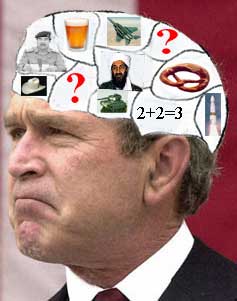This first part, of two, considering the brain that might not really be there, has been seen by some subscribers when I emailed it around back in August. So it is slightly dated. But it compliments part II, which will appear in a day or so, so I am reprising it. This time it also gets a graphic.

Inside Boosh’s Brain (Actual Size).
©2004 UrbisMedia
The Man Who Wasn’t There: A Guide to Bushian Logic
Back in the Pleistocene, when I was a young boy, we used to recite a little quatrain conundrum. As I recall, it went like this: Yesterday, upon a stair, / I saw a man who wasn’t there. / Again, he wasn’t there today, / Gee, I wish he’d go away.
As a kid, I never regarded this as much more than a clever little poem. I was too young to appreciate that it might also form the basis of a logical system. The poem lay dormant in the recesses of long term memory for decades, only to be recently awakened by none other that George W. Bush.
Although I fervently wish that G.W. was a man who “wasn’t there,” he is, regrettably there “again today,” and just won’t “go away.” Never mind that he shouldn’t be where he is in the first place, because he wasn’t elected, and because there he was, President of the United States, telling us why we needed to make war on Iraq.
That war is over (sort of), but the rhetorical war wages on. That’s because there are lingering questions about the reasons for it. The most recent of these is, of course, the phantom of WMDs, weapons of mass destruction, which, it seems are turning out to be more like weapons of mass deception. There are the 500 tons of chemical weapons Bush spoke of that are turning out not to be there. There are the aluminum tubes for making “nuk-u-leer” weapons, as Bush would say, that experts say were not designed for that. And, there is request for the tons of “yellowcake” uranium Saddam Hussein was supposedly getting from Niger that turns out to be forged.
These compelling bits of “intelligence” formed the basis for the claim that Saddam Hussein’s mass destruction capability formed an “imminent threat” to his neighbors and to the country that had kicked his ass, embargoed him, and sent inspectors to rummage around for, yup, WMDs. Sure, he might have hidden away a few SCUD missiles that couldn’t go much farther than Tel Aviv and were about as accurate as a whiffle ball, but he just might give some of this stuff to his “friends” at Al Qaeda, even though they are a bunch of religious extremists who would rather overthrow his secular government than collude with it.
Well we all know what happened to the “imminent threat.” It’s no longer there. But was it ever “there” in the first place? Doesn’t matter, that’s where Bushian logic comes in: he got rid of the threat before anybody could prove it wasn’t there. Don’t you feel safer? Saddam’s gone and won’t be able to threaten us with those WMDs he never had in the first place, got rid of, or were “yellowcake” hoaxes. Bush made things go away that were never there. That’s Bushian logic. Quod Erat Demonstrandum!
You should feel safer (if poorer). It cost you a lot of money, and it cost a lot of lives, to get rid of that “imminent threat.” You might just want to know if it was all necessary. You might just want to know if those “imminent threats” were really there . Never mind if Bush really can’t come up with proof because he still expects it will be found! If Bushian logic were a system of jurisprudence you could execute a person on the basis of charges rather than evidence; you would just look for the evidence later. (Yes, I know, George is from Texas, land of executions.) So, believing that a country is an “imminent threat” is now a sufficient case for war.
What? You don’t think so? OK, then, Bushian logic will then ask you to accept that the war was worth it because we rescued the Iraqi people from their rotten tyrant. Clever, eh. How could you gainsay getting rid of somebody as nasty as Saddam Hussein. So, see, we did something good after all even if it was a reason you might not have found sufficient for war in the first place. After all, it’s one thing to be a threat to your own people—dictators abound who are that—but another to be an “imminent threat” to the most powerful nation on the face of the earth. But now you have to deal with the question ex post facto . It’s a done deal. Kinda like a logical trump card.
I have to admit: a lot of people think that George W. Bush is not a very bright guy. But to anybody who wants to challenge him to a little war of logic he’ll likely say “Bring ‘em on.”
But somehow that little poem keeps coming back and haunting me. It just won’t “go away.” I keep thinking about Kim Il Jung: yesterday he wasn’t there; he wasn’t there today, either; gee, I wish he’d go away. I wonder if Bushian logic has an answer for than one.
___________________________________
©2004, James A. Clapp (UrbisMedia Ltd. Pub. 2.9.2004)
